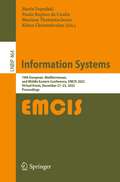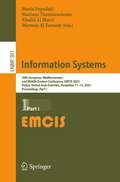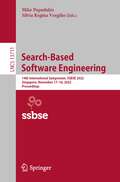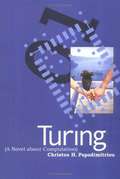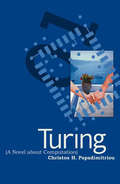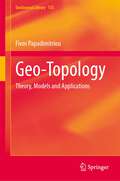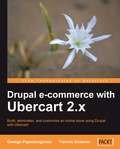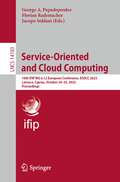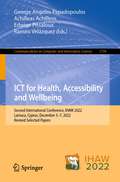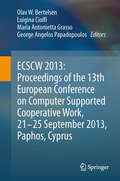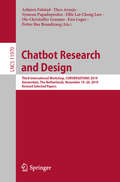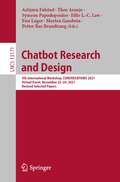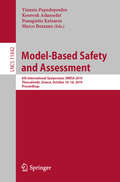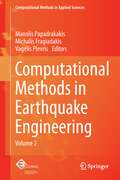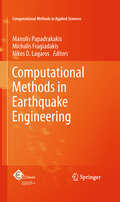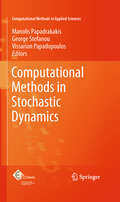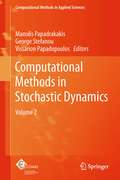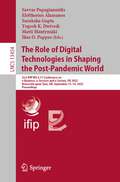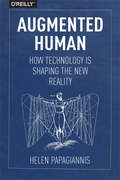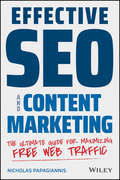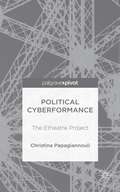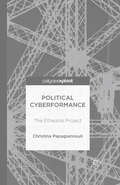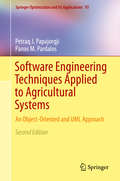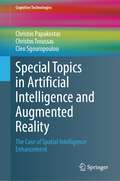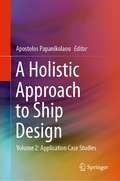- Table View
- List View
Information Systems: 19th European, Mediterranean, and Middle Eastern Conference, EMCIS 2022, Virtual Event, December 21–22, 2022, Proceedings (Lecture Notes in Business Information Processing #464)
by Maria Papadaki Paulo Rupino da Cunha Marinos Themistocleous Klitos ChristodoulouThis book constitutes selected papers from the 19th European, Mediterranean, and Middle Eastern Conference, EMCIS 2022, which was held virtually during December 7-8, 2022.EMCIS covers technical, organizational, business, and social issues in the application of information technology and is dedicated to the definition and establishment of Information Systems (IS) as a discipline of high impact for IS professionals and practitioners. It focuses on approaches that facilitate the identification of innovative research of significant relevance to the IS discipline following sound research methodologies that lead to results of measurable impact. The 47 papers presented in this volume were carefully reviewed and selected from a total of 136 submissions. They were organized in topical sections named: Artificial intelligence; big data and analytics; blockchain technology and applications; cloud computing; digital governance; digital services and social media; emerging computing technologies and trends for business process management; enterprise systems; information system security and information privacy protection; innovative research projects; IT governance and alignment; management and organizational issues in information systems; and metaverse.
Information Systems: 20th European, Mediterranean, and Middle Eastern Conference, EMCIS 2023, Dubai, United Arab Emirates, December 11-12, 2023, Proceedings, Part I (Lecture Notes in Business Information Processing #501)
by Maria Papadaki Marinos Themistocleous Khalid Al Marri Marwan Al ZarouniThis book constitutes selected papers from the 20th European, Mediterranean, and Middle Eastern Conference, EMCIS 2023, which was held in Dubai, UAE, during December 11-12, 2023. EMCIS covers technical, organizational, business, and social issues in the application of information technology and is dedicated to the definition and establishment of Information Systems (IS) as a discipline of high impact for IS professionals and practitioners. It focuses on approaches that facilitate the identification of innovative research of significant relevance to the IS discipline following sound research methodologies that lead to results of measurable impact. The 43 papers presented in this volume were carefully reviewed and selected from a total of 126 submissions. They were organized in topical sections as follows: Part I: Metaverse; blockchain technology and applications; digital governance; healthcare information systems; artificial intelligence; Part II: Big data and analytics; digital services and social media; innovative research projects; managing information systems; smart cities.
Search-Based Software Engineering: 14th International Symposium, SSBSE 2022, Singapore, November 17–18, 2022, Proceedings (Lecture Notes in Computer Science #13711)
by Mike Papadakis Silvia Regina VergilioThis book constitutes the proceedings of the 14th International Symposium on Search-Based Software Engineering, SSBSE 2022, which was held in Singapore, in November 2022.The 6 regular papers, the NIER and RENE tracks as well as the Challenge Track that were included in this volume were carefully reviewed and selected from 15 submissions. The papers deal with novel ideas and applications of search-based software engineering, focusing on engineering challenges and the application of automated approaches and optimization techniques from AI and machine learning research.
Turing: A Novel about Computation
by Christos H. PapadimitriouThe world of computation according to Turing, an interactive tutoring program, as told to star-crossed lovers; a novel.
Turing: A Novel About Computation
by Christos H. PapadimitriouThe world of computation according to Turing, an interactive tutoring program, as told to star-crossed lovers: a novel. Our hero is Turing, an interactive tutoring program and namesake (or virtual emanation?) of Alan Turing, World War II code breaker and father of computer science. In this unusual novel, Turing's idiosyncratic version of intellectual history from a computational point of view unfolds in tandem with the story of a love affair involving Ethel, a successful computer executive, Alexandros, a melancholy archaeologist, and Ian, a charismatic hacker. After Ethel (who shares her first name with Alan Turing's mother) abandons Alexandros following a sundrenched idyll on Corfu, Turing appears on Alexandros's computer screen to unfurl a tutorial on the history of ideas. He begins with the philosopher-mathematicians of ancient Greece—"discourse, dialogue, argument, proof... can only thrive in an egalitarian society"—and the Arab scholar in ninth-century Baghdad who invented algorithms; he moves on to many other topics, including cryptography and artificial intelligence, even economics and developmental biology. (These lessons are later critiqued amusingly and developed further in postings by a fictional newsgroup in the book's afterword.) As Turing's lectures progress, the lives of Alexandros, Ethel, and Ian converge in dramatic fashion, and the story takes us from Corfu to Hong Kong, from Athens to San Francisco—and of course to the Internet, the disruptive technological and social force that emerges as the main locale and protagonist of the novel. Alternately pedagogical and romantic, Turing (A Novel about Computation) should appeal both to students and professionals who want a clear and entertaining account of the development of computation and to the general reader who enjoys novels of ideas.
Geo-Topology: Theory, Models and Applications (GeoJournal Library #133)
by Fivos PapadimitrouGeo-Topology is an exploration of the depth and breadth of the relationships between Geography and Topology, with applications ranging from Landscape Geography to Social Geography and from Spatial Analysis to Geospatial Technologies. It shows how topics of geographical research (landscapes, borders, spatial social relationships etc) can be examined by using mathematical concepts and methods of Topology, exposing the realm of geo-topological modelling and visualization through Point-Set Topology, Knot Theory, Reeb graphs, Topological Surfaces (i.e. Möbius bands and Klein bottles), Differential Topology, Network Analysis, Combinatorial Topology, Braid Theory and Ultrametric Topology. Besides geographers, this book is a trove of new ideas for landscape ecologists, mathematicians, data scientists, sociologists, psychologists, anthropologists and educators. Geo-Topology is a systematic introduction to topological thinking in Geography, also by highlighting the significance of Topology for Geographical Education, as well as for the Philosophy and Epistemology of Geography.
Drupal E-commerce with Ubercart 2.x
by George Papadongonas Yiannis DoxarasThis book will take you through the basics, like Drupal and Ubercart installation and common settings, and as we proceed through the chapters, we'll implement more advanced techniques. Whether you know Drupal or not, this book will be your guide to creating a powerful e-commerce web site. If you are a business owner wanting to create an eCommerce website for your company or to upgrade a company eShop to be easier to maintain and have advanced e-shopping capabilities, then this book is meant for you. You don't need any programming experience to use this book.
Service-Oriented and Cloud Computing: 10th IFIP WG 6.12 European Conference, ESOCC 2023, Larnaca, Cyprus, October 24–25, 2023, Proceedings (Lecture Notes in Computer Science #14183)
by George A. Papadopoulos Florian Rademacher Jacopo SoldaniThis book constitutes the constitutes the refereed proceedings of the 10th IFIP WG 6.12 European Conference on Service-Oriented and Cloud Computing , ESOCC 2023, held in Larnaca, Cyprus, during October 24–26, 2023. The 12 full papers and 4 short papers included in this book were carefully reviewed and selected from 40 submissions. They were organized in topical sections as follows: Microservices; Quality of Service; Service Orchestration; Edge Computing; PhD Symposium; and Industry Projects Track.
ICT for Health, Accessibility and Wellbeing: Second International Conference, IHAW 2022, Larnaca, Cyprus, December 5–7, 2022, Revised Selected Papers (Communications in Computer and Information Science #1799)
by George Angelos Papadopoulos Achilleas Achilleos Edwige Pissaloux Ramiro VelázquezThis book constitutes the refereed post-conference proceedings of the Second International Conference on ICT for Health, Accessibility and Wellbeing, IHAW 2022, held in Larnaca, Cyprus, in December 2022. The revised 14 full papers and 3 short papers presented were carefully selected from 33 submissions. The papers are thematically arranged in the following sections: Visual Impairment and ICT for Mobility; ICT and Student Health; ICT and Wellbeing and ICT & Health prevention
ECSCW 2013: Proceedings of the 13th European Conference on Computer Supported Cooperative Work, 21-25 September 2013, Paphos, Cyprus
by George Angelos Papadopoulos Maria Antonietta Grasso Luigina Ciolfi Olav W. BertelsenThis volume presents the proceedings of ECSCW 2013, the 13th European Conference on Computer Supported Cooperative Work. Each conference offers an occasion to critically review our research field, which has been multidisciplinary and committed to high scientific standards, both theoretical and methodological, from its beginning. The papers this year focus on work and the enterprise as well as on the challenges of involving citizens, patients, etc. into collaborative settings. The papers embrace new theories, and discuss known ones. They contribute to the discussions on the blurring boundaries between home and work and on the ways we think about and study work. They introduce recent and emergent technologies, and study known social and collaborative technologies. With contributions from all over the world, the papers in interesting ways help focus on the European perspective in our community. The 15 papers selected for this conference deal with and reflect the lively debate currently ongoing in our field of research.
Chatbot Research and Design: Third International Workshop, CONVERSATIONS 2019, Amsterdam, The Netherlands, November 19–20, 2019, Revised Selected Papers (Lecture Notes in Computer Science #11970)
by Symeon Papadopoulos Asbjørn Følstad Theo Araujo Effie Lai-Chong Law Ole-Christoffer Granmo Ewa Luger Petter Bae BrandtzaegThis book constitutes the refereed proceedings of the Third International Workshop on Chatbot Research and Design, CONVERSATIONS 2019, held in Amsterdam, The Netherlands, in November 2019. The 18 revised full papers presented in this volume were carefully reviewed and selected from 31 submissions.The papers are grouped in the following topical sections: user and communication studies user experience and design, chatbots for collaboration, chatbots for customer service, and chatbots in education.
Chatbot Research and Design: 5th International Workshop, CONVERSATIONS 2021, Virtual Event, November 23–24, 2021, Revised Selected Papers (Lecture Notes in Computer Science #13171)
by Symeon Papadopoulos Asbjørn Følstad Theo Araujo Ewa Luger Petter Bae Brandtzaeg Effie L.-C. Law Morten GoodwinThis book constitutes the proceedings of the 5th International Workshop on Chatbot Research and Design, CONVERSATIONS 2021, which was held during November 2021.Due to COVID-19 pandemic the conference was held online.The 12 papers included in this volume were carefully reviewed and selected from a total of 25 submissions. The papers in the proceedings are structured in four topical groups: Chatbot User Insight, Chatbots Supporting Collaboration and Social Interaction, and Chatbot UX and Design.
Model-Based Safety and Assessment: 6th International Symposium, IMBSA 2019, Thessaloniki, Greece, October 16–18, 2019, Proceedings (Lecture Notes in Computer Science #11842)
by Yiannis Papadopoulos Koorosh Aslansefat Panagiotis Katsaros Marco BozzanoThis book constitutes the proceedings of the 6th International Symposium on Model-Based Safety and Assessment, IMBSA 2019, held inThessaloniki, Greece, in October 2019.The 24 revised full papers presented were carefully reviewed and selected from 46 initial submissions. The papers are organized in topical sections on safety models and languages; dependability analysis process; safety assessment; safety assessment in automotive industry; AI in safety assessment.
Computational Methods in Earthquake Engineering: Volume 2 (Computational Methods in Applied Sciences #30)
by Manolis Papadrakakis Michalis Fragiadakis Vagelis PlevrisThis book provides an insight on advanced methods and concepts for the design and analysis of structures against earthquake loading. This second volume is a collection of 28 chapters written by leading experts in the field of structural analysis and earthquake engineering. Emphasis is given on current state-of-the-art methods and concepts in computing methods and their application in engineering practice. The book content is suitable for both practicing engineers and academics, covering a wide variety of topics in an effort to assist the timely dissemination of research findings for the mitigation of seismic risk. Due to the devastating socioeconomic consequences of seismic events, the topic is of great scientific interest and is expected to be of valuable help to scientists and engineers. The chapters of this volume are extended versions of selected papers presented at the COMPDYN 2011 conference, held in the island of Corfu, Greece, under the auspices of the European Community on Computational Methods in Applied Sciences (ECCOMAS).
Computational Methods in Earthquake Engineering: Volume 2 (Computational Methods in Applied Sciences #21)
by Manolis Papadrakakis Nikos D. Lagaros Michalis FragiadakisThis book provides an insight in advanced methods and concepts for structural analysis and design against seismic loading. The book consists of 25 chapters dealing with a wide range of timely issues in contemporary Earthquake Engineering. In brief, the topics covered are: collapse assessment, record selection, effect of soil conditions, problems in seismic design, protection of monuments, earth dam structures and liquid containers, numerical methods, lifetime assessment, post-earthquake measures. A common ground of understanding is provided between the communities of Earth Sciences and Computational Mechanics towards mitigating seismic risk. The topic is of great social and scientific interest, due to the large number of scientists and practicing engineers currently working in the field and due to the great social and economic consequences of earthquakes.
Computational Methods in Stochastic Dynamics: Volume 2 (Computational Methods in Applied Sciences #22)
by Manolis Papadrakakis George Stefanou Vissarion PapadopoulosAt the dawn of the 21st century, computational stochastic dynamics is an emerging research frontier. This book focuses on advanced computational methods and software tools which can highly assist in tackling complex problems in stochastic dynamic/seismic analysis and design of structures. The book is primarily intended for researchers and post-graduate students in the fields of computational mechanics and stochastic structural dynamics. Nevertheless, practice engineers as well could benefit from it as most code provisions tend to incorporate probabilistic concepts in the analysis and design of structures. The book addresses mathematical and numerical issues in stochastic structural dynamics and connects them to real-world applications. It consists of 16 chapters dealing with recent advances in a wide range of related topics (dynamic response variability and reliability of stochastic systems, risk assessment, stochastic simulation of earthquake ground motions, efficient solvers for the analysis of stochastic systems, dynamic stability, stochastic modelling of heterogeneous materials). Numerical examples demonstrating the significance of the proposed methods are presented in each chapter.
Computational Methods in Stochastic Dynamics: Volume 2 (Computational Methods in Applied Sciences #26)
by Manolis Papadrakakis George Stefanou Vissarion PapadopoulosThe considerable influence of inherent uncertainties on structural behavior has led the engineering community to recognize the importance of a stochastic approach to structural problems. Issues related to uncertainty quantification and its influence on the reliability of the computational models are continuously gaining in significance. In particular, the problems of dynamic response analysis and reliability assessment of structures with uncertain system and excitation parameters have been the subject of continuous research over the last two decades as a result of the increasing availability of powerful computing resources and technology. This book is a follow up of a previous book with the same subject (ISBN 978-90-481-9986-0) and focuses on advanced computational methods and software tools which can highly assist in tackling complex problems in stochastic dynamic/seismic analysis and design of structures. The selected chapters are authored by some of the most active scholars in their respective areas and represent some of the most recent developments in this field. The book consists of 21 chapters which can be grouped into several thematic topics including dynamic analysis of stochastic systems, reliability-based design, structural control and health monitoring, model updating, system identification, wave propagation in random media, seismic fragility analysis and damage assessment. This edited book is primarily intended for researchers and post-graduate students who are familiar with the fundamentals and wish to study or to advance the state of the art on a particular topic in the field of computational stochastic structural dynamics. Nevertheless, practicing engineers could benefit as well from it as most code provisions tend to incorporate probabilistic concepts in the analysis and design of structures.
The Role of Digital Technologies in Shaping the Post-Pandemic World: 21st IFIP WG 6.11 Conference on e-Business, e-Services and e-Society, I3E 2022, Newcastle upon Tyne, UK, September 13–14, 2022, Proceedings (Lecture Notes in Computer Science #13454)
by Savvas Papagiannidis Eleftherios Alamanos Suraksha Gupta Yogesh K. Dwivedi Matti Mäntymäki Ilias O. PappasThis book constitutes the refereed proceedings of the 21st IFIP WG 6.11 Conference on e-Business, e-Services, and e-Society, I3E 2022, which took place Newcastle-upon-Tyne, UK, in September 2022. The 37 papers presented in this volume were carefully reviewed and selected from 72 submissions. They were organized in topical sections as follows: Artificial intelligence; Data and Analytics; Careers and ICT; Digital Innovation and Transformation; Electronic Services; Health and Wellbeing; Pandemic; Privacy, Trust and Security.
Augmented Human: How Technology Is Shaping the New Reality
by Helen PapagiannisAugmented Reality (AR) blurs the boundary between the physical and digital worlds. In AR’s current exploration phase, innovators are beginning to create compelling and contextually rich applications that enhance a user’s everyday experiences. In this book, Dr. Helen Papagiannis—a world-leading expert in the field—introduces you to AR: how it’s evolving, where the opportunities are, and where it’s headed.If you’re a designer, developer, entrepreneur, student, educator, business leader, artist, or simply curious about AR’s possibilities, this insightful guide explains how you can become involved with an exciting, fast-moving technology.You’ll explore how:Computer vision, machine learning, cameras, sensors, and wearables change the way you see the worldHaptic technology syncs what you see with how something feelsAugmented sound and hearables alter the way you listen to your environmentDigital smell and taste augment the way you share and receive informationNew approaches to storytelling immerse and engage users more deeplyUsers can augment their bodies with electronic textiles, embedded technology, and brain-controlled interfacesHuman avatars can learn our behaviors and act on our behalf
Effective SEO and Content Marketing: The Ultimate Guide for Maximizing Free Web Traffic
by Nicholas PapagiannisGet beyond the basics and see how modern-day users are reimaging the SEO process SEO is often underutilized and overlooked across the marketing realm today. SEO is not merely trying to improve your website ranking on Google, but it can spark and optimize ideas. Above all it can help improve the amount of free traffic coming to your web properties. This book provides you with a comprehensive approach to make sure marketing spend is utilized as effectively as possible and deliver the best ROI for your brand and business. Maximizing your organic (free) traffic channels should be a top priority and this book will provide you with insight on how to do that. From working with social media influencers to steering creative ideas and campaigns, modern day SEO requires a full-service perspective of marketing and its processes. General education on SEO and organic content marking Understanding which search engines to focus on How SEO and content can solve business problems Building a new brand through SEO and content Identifying who your true competitors are Which Analytics reports you should be regularly monitoring How to establish research channels that can inform your business initiatives Building personas and audience purchase journeys Prioritizing locations, demographics and countries What needs to be in place to maximize free traffic levels to your brands assets Understanding all the key tasks and attributes for an effective content program Data-Driven Content: Detailed instruction on how to use data to inform content responses, ideas and asset types Understanding different content asset types from standard items like articles to highly advanced assets like films, podcasts, white papers and other assets Calculating ROI for SEO and Content initiatives Small business marketing via content and SEO and having the right small business mindset for success Website and content design considerations (accessibility, principles of marketing) Optimizing for the future and looking at other search venues Amazon Optimization YouTube Optimization App Store Optimization (ASO) Podcast Optimization Optimizing Blogs and other off-site content Prepping and optimizing for the newest technologies, including voice search, artificial intelligence, and content discovery vehicles How to build an optimization path and programs that drive results and manage risks In addition to learning the most effective processes to structure your SEO, you will have access to bonus materials that accompany this book which will include worksheets, checklists, creative brief examples, quizzes, and best interview questions when hiring an SEO specialist. Modern-day marketers, business owners, and brand managers, this book is for you!
Political Cyberformance: The Etheatre Project
by Christina PapagiannouliWritten from a practice-based perspective, this book focuses on the political character of 'cyberformance': the genre of digital performance that uses the Internet as a performance space. The Etheatre Project comprises a series of experimental cyberformances aiming to reconsider the characteristics of theatre in the Internet age.
Software Engineering Techniques Applied to Agricultural Systems
by Petraq J. Papajorgji Panos M. PardalosSoftware Engineering Techniques Applied to Agricultural Systems presents cutting-edge software engineering techniques for designing and implementing better agricultural software systems based on the object-oriented paradigm and the Unified Modeling Language (UML). The focus is on the presentation of rigorous step-by-step approaches for modeling flexible agricultural and environmental systems, starting with a conceptual diagram representing elements of the system and their relationships. Furthermore, diagrams such as sequential and collaboration diagrams are used to explain the dynamic and static aspects of the software system. This second edition includes: a new chapter on Object Constraint Language (OCL), a new section dedicated to the Model-VIEW-Controller (MVC) design pattern, new chapters presenting details of two MDA-based tools - the Virtual Enterprise and Olivia Nova and a new chapter with exercises on conceptual modeling. It may be highly useful to undergraduate and graduate students as the first edition has proven to be a useful supplementary textbook for courses in mathematical programming in agriculture, ecology, information technology, agricultural operations research methods, agronomy and soil science and applied mathematical modeling. The book has broad appeal for anyone involved in software development projects in agriculture and to researchers in general who are interested in modeling complex systems. From the reviews of the first edition: "The book will be useful for those interested in gaining a quick understanding of current software development techniques and how they are applied in practice. . . this is a good introductory text on the application of OOAD, UML and design patters to the creation of agricultural systems. It is technically sound and well written. " --Computing Reviews, September 2006
Special Topics in Artificial Intelligence and Augmented Reality: The Case of Spatial Intelligence Enhancement (Cognitive Technologies)
by Christos Papakostas Christos Troussas Cleo SgouropoulouThis monograph explores the synergy of Artificial Intelligence (AI), Augmented Reality (AR) and cognitive processes to enhance spatial abilities — an integral aspect of cognitive development. The ability to comprehend and manipulate spatial information is not only fundamental to our understanding of the physical world but also plays a pivotal role in numerous academic and professional fields. Recognizing the profound impact of spatial ability on scientific disciplines and educational achievement, this monograph takes on the challenge of enhancing spatial skills among users.The authors present the design and development of a mobile training system that incorporates AR features to enhance learners’ spatial ability. Involving mental generation, transformation, and rotation of visual images for understanding spatial relationships, spatial ability is closely linked to success in various scientific disciplines and educational pursuits. While spatial visualization skills tests are available, this monograph takes a unique approach by focusing on developing targeted interventions to improve spatial ability. It aims to unlock new avenues for cognitive growth and dive into the untapped potential within the realm of spatial intelligence. Beyond its emphasis on spatial ability enhancement, this monograph goes above and beyond traditional approaches by integrating AI techniques into the training system. As such, it aims to provide personalized and adaptive learning experiences for learners. The training system, through intelligent techniques, dynamically analyzes individual learners’ strengths, weaknesses, and progress, tailoring content and challenges to their specific needs. This effort establishes a new frontier in educational technology, offering a groundbreaking solution that not only augments spatial ability development but also showcases the transformative potential of AI in reshaping the learning experience.The book is a valuable resource for researchers, educators, developers and technology enthusiasts, as it exemplifies the profound impact of AI and AR in shaping the future of online learning experiences.
A Holistic Approach to Ship Design: Volume 2: Application Case Studies
by Apostolos PapanikolaouThis book deals with modern Computer-Aided Design (CAD) software tools and platforms implemented in ship design, the integration of techno-economic databases, the use of optimisation and simulation software tools, which are integrated in these platforms, and the virtual modelling of ships and their operation by using a Virtual Vessel Framework (VVF). It contains a series of application case studies related to the developed holistic approach to ship design and operation. Nine case studies are described, referring to the design and operation of various ship types, namely RoPax, cruise ship, double-ended ferry, bulk carrier, containership, offshore support vessel, ocean surveillance ship and research vessel and one offshore structure. All case studies are driven by leading representatives of the European Maritime Industry. This book complements A Holistic Approach to Ship Design, volume 1, which covers methods and tools for the life cycle optimisation and assessment of ship design and operation.
